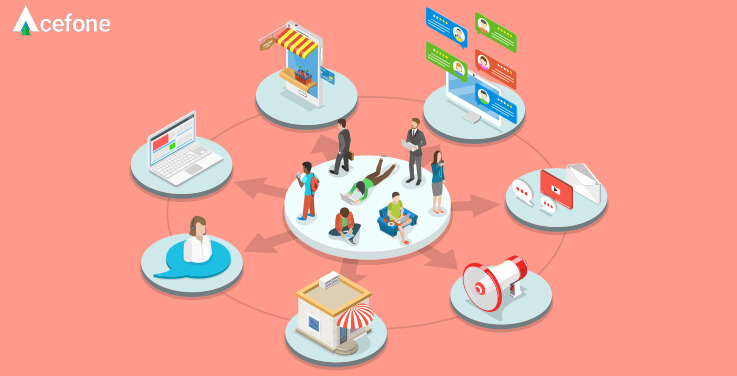Customer satisfaction and customer surveys
According to Microsoft’s Global State of Customer Service Report, 90% of Americans use customer service as a factor in deciding whether or not to do business with a company.
Needless to say, customer satisfaction should be the topmost priority of every business, regardless of the kind of products and services they offer. Customer satisfaction has time and again proven to be one of the biggest Key Performance Indicators (KPIs) for businesses.
That said, it is difficult to measure true customer satisfaction. However, one of the best solutions to this issue is to directly ask them using customer surveys.
What are customer surveys?
A survey designed to understand the customer’s perception of an organisation is known as a customer survey.
It includes various questions related to their thoughts about the brand’s products and services, their purchase experience with the brand, whether they think the products are appropriately priced and what their overall perception of the business is.
These surveys can be a set of multiple-choice questions, open-ended questions or a mix of both.
One of the most widely used methods of surveying customers is to collect their feedback via text-based formats. IVR surveys in text format are also becoming increasingly popular.
These are simple and easy to understand messages for the customers, with several ways to record a response or collect feedback from them. IVR surveys also help a company maintain a better track of its customer data.
Using features like bulk SMSes or SMS blasts, a wide range of both current and potential customers can be interacted with at the same time.
An introduction to IVR and text surveys
Text-based surveys are one of the most convenient methods of communication between a business and its customers. These surveys help in maintaining a collection of customer feedback, facilitating opportunities to elevate the customer experience.
Indian’s have a diverse range of mobile devices. While the majority, over 800 million people are now active smartphone users, there still exist users of older phones. The good news—text IVR surveys can be conducted on both, smart as well as normal mobile devices.
Businesses can conduct different types of surveys to obtain data. Some examples of commonly used surveys to collect feedback on a macro level are:
- Net Promoter Score (NPS) surveys: NPS surveys are used to get an idea of how many customers are willing to promote a brand they have used. These are mainly used to test a company’s customer loyalty
- Post-purchase surveys: As the name suggests, post-purchase surveys are essentially done right after purchase to understand the customer’s overall buying experience
- Customer Effort Score (CES) surveys: These surveys help businesses understand the efforts that a customer had to put in to complete a purchasing cycle
Features like bulk SMS (Also known as SMS blasts) can be used to reach a large audience at the same time.
How do customer surveys help build customer satisfaction?
Customer surveys help businesses achieve many goals. They’re able to identify service gaps and pain points for customers and fix issues accordingly. Moreover, companies can reach out to aggrieved buyers and offer compensations, discounts and vouchers to make up for any inconveniences.
Additionally, surveys also help businesses predict customer needs and demands and alter their offerings to suit the same. Thus, organisations are able to proactively devise better strategies and stay ahead of their competitors.
Explained below are five of the many ways in which text and IVR surveys can help with a business’ customer satisfaction goals:
1. Customers feel valued and appreciated
The distance between what your business is delivering and what the customers expect can be effectively bridged with the help of text surveys. Acting upon customer demands and ensuring your customers feel valued, both help in boosting customer satisfaction and loyalty.
The disconnect between what is expected and what is offered can be removed once buyer feedback is collected regularly. If buyers know their ideas and expectations are actually taken into consideration, they are more likely to do repeat business with your company.
Frequent IVR text surveys can be sent out to several customers, at the same time, using the SMS blast service.
These surveys are one of the simplest and least obstructive methods for collecting and maintaining customer data and feedback. They cut through the marketing clutter of unending voice calls and promotional emails.
In fact, this data can also be used to offer personalised services via IVR technology.
2. Increasing customer engagement
In today’s time, when practices like social distancing are overshadowing most offline interactions for the entire world, keeping in touch with customers is one of the most important steps that a business can take to work on its customer engagement levels.
89% of customers worldwide expect organisations to give them the opportunity to express their thoughts and opinions in the form of feedback. Following up on a post-purchase basis, demanding regular feedback and checking in on customers can all be done via text messages.
For this, tools like automated IVRs come in handy. These IVRs do not simply automate the calling process, but can also pre-determine quality of leads, thereby improving conversion rates.
Additionally, companies can reach out to leads using SMS blast services and inform them about upcoming discount offers, sale offers and other such events.
3. Strengthens company-client relationships
A business-client relation is based on trust, which can be fragile. While the former can make mistakes in fulfilling exactly what is expected, the latter may be left dissatisfied despite all the services they are offered.
However, in such a scenario, there is no way that the business does not address the issues of buyers. Unhappy customers will not just leave, but may also negatively talk about your business to friends and family, or post it on social media.
By using text surveys, businesses can follow up with customers to find unexpected loopholes. Once followed upon, these can be fixed with repair measures to smoothen the overall sales process.
4. Proactive customer engagement
Traditional customer interactions relied heavily on prospects reaching out for information. Proactive customer engagement, on the other hand, is when a brand maintains constant interaction with buyers throughout their purchase journey.
During proactive customer engagement, a brand tries to resolve customer concerns even before a purchase decision has been made.
A proactive customer experience can be created only when a business tracks and analyses customer data. This data can be easily collected through the use of text-based IVR surveys.
5. Listening to customer demands
Polls are an interactive feature offered by IVR systems. Customers can be asked simple ‘Yes’ or ‘No’ questions or those with multiple choice. Such interactive feedback collection methods can help businesses gain deeper insights into what a customer wishes from their favourite brands.
Buying experiences can be improved with the incorporation of feedback measures that use hyper-personalisation techniques. Different sets of interactive text surveys can be designed for different sets of audiences, sent using SMS blasts.
Such ways of communication not only help improve the customers’ perspective about a company but also help strengthen the business-buyer relationship.
Conclusion
As advanced technology becomes accessible to buyers and sellers, it is the perfect time to create highly customised IVR surveys for your business—one’s that not only ask questions specific to your products and services but also help with efficient management of customer data.
Therefore, right now may be the best time for every business to look into its customer service techniques, understand every scope that there is for improvisation, and immediately get to work!
Try Acefone’s cloud telephony solutions today.














